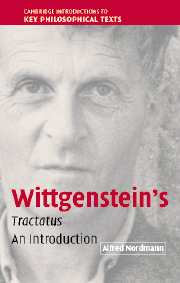Book contents
- Frontmatter
- Contents
- Preface
- List of abbreviations of works by Wittgenstein
- Introduction: Wittgenstein's provocation
- 1 Critical philosophy
- 2 The argument
- 3 Thought experiments
- 4 Tense and mood
- 5 The senses of sense
- Conclusion: a sense of familiarity
- References
- Index of names and subjects
- Index of passages
5 - The senses of sense
Published online by Cambridge University Press: 03 February 2010
- Frontmatter
- Contents
- Preface
- List of abbreviations of works by Wittgenstein
- Introduction: Wittgenstein's provocation
- 1 Critical philosophy
- 2 The argument
- 3 Thought experiments
- 4 Tense and mood
- 5 The senses of sense
- Conclusion: a sense of familiarity
- References
- Index of names and subjects
- Index of passages
Summary
In the years between completion and publication of the Tractatus Wittgenstein insisted that he could not change a word of it. He had conducted his thought experiment in earnest, after all, recording faithfully “what – and how it has – really occurred” to him. He had seriously pursued his hypotheses and under their guidance attacked the problem of clarifying the relation of language and world: if it were possible to solve these problems, his solution could well have been “unassailable and definitive.” But alas, since this solution undercuts the very hypotheses that underwrote and induced the experiment, it has to be abandoned and the value of his book therefore consists partly “in that it shows how little has been achieved when these problems are solved.” And so, though his sentences turn out to be nonsensical, he considered them by no means arbitrary, and nor should we.
My interpretation began innocently enough with a rather orthodox treatment of Wittgenstein's views. It did not reject or even qualify what, already in 1959, Elizabeth Anscombe called “the best-known thesis of the Tractatus,” namely that “‘metaphysical’ statements are nonsensical, and that the only sayable things are propositions of natural science.” And yet, for all my attempts to stick closely to the text, I am now referring not just to what Wittgenstein wrote but also to what he did not write about – to the language in which the Tractatus itself was written, to statements in past and future tense and the subjunctive mood, to expressions that are nonsensical but not senseless, to thought and any sense whatsoever that is inexpressible in speech but nevertheless expressed by the Tractatus.
- Type
- Chapter
- Information
- Wittgenstein's TractatusAn Introduction, pp. 159 - 202Publisher: Cambridge University PressPrint publication year: 2005

